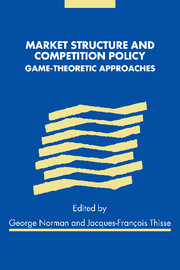Book contents
- Frontmatter
- Contents
- List of figures
- List of tables
- List of contributors
- Louis Phlips: a brief biography
- Introduction
- 1 Competition policy and game-theory: reflections based on the cement industry case
- 2 Legal standards and economic analysis of collusion in EC competition policy
- 3 A guided tour of the Folk Theorem
- 4 Predatory pricing and anti-dumping
- 5 Should pricing policies be regulated when firms may tacitly collude?
- 6 Tougher price competition or lower concentration: a trade-off for anti-trust authorities?
- 7 The strategic effects of supply guarantees: the raincheck game
- 8 Product market competition policy and technological performance
- 9 On some issues in the theory of competition in regulated markets
- 10 Modelling the entry and exit process in dynamic competition: an introduction to repeated-commitment models
- 11 Coordination failures in the Cournot approach to deregulated bank competition
- 12 How the adoption of a new technology is affected by the interaction between labour and product markets
- Index
2 - Legal standards and economic analysis of collusion in EC competition policy
Published online by Cambridge University Press: 22 September 2009
- Frontmatter
- Contents
- List of figures
- List of tables
- List of contributors
- Louis Phlips: a brief biography
- Introduction
- 1 Competition policy and game-theory: reflections based on the cement industry case
- 2 Legal standards and economic analysis of collusion in EC competition policy
- 3 A guided tour of the Folk Theorem
- 4 Predatory pricing and anti-dumping
- 5 Should pricing policies be regulated when firms may tacitly collude?
- 6 Tougher price competition or lower concentration: a trade-off for anti-trust authorities?
- 7 The strategic effects of supply guarantees: the raincheck game
- 8 Product market competition policy and technological performance
- 9 On some issues in the theory of competition in regulated markets
- 10 Modelling the entry and exit process in dynamic competition: an introduction to repeated-commitment models
- 11 Coordination failures in the Cournot approach to deregulated bank competition
- 12 How the adoption of a new technology is affected by the interaction between labour and product markets
- Index
Summary
Introduction
In his presidential address to the European Economic Association (Phlips, 1996), Louis Phlips noted that the legal framework towards collusion in the European Union drew an interesting distinction between agreements and concerted practice. He further conjectured that the latter concept might cover what economists would refer to as ‘tacit collusion’, or ‘implicit coordination’. This conjecture, which I found intriguing, is further investigated in this chapter. Its objective is thus to evaluate the legal standard and underlying economic analysis applied in the European Community towards collusion.
For a long time, collusion was not considered as a serious concern for policy makers. Throughout the 1950s and 1960s, the view was indeed widely held among economists that firms could not exercise market power collectively without some form of explicit coordination. They pointed out that if firms selling substitutes often had a collective interest in raising price above marginal cost, such a move was not compatible with individual incentives. Firms would thus attempt to cheat and secretly expand sales, thereby taking advantage of the output restriction undertaken by their competitors. As a consequence, informal cartels were considered to be inherently unstable in the absence of explicit enforcement mechanisms and accordingly were not seen as a major concern for anti-trust policy (see Stigler, 1956, for a vivid exposition of this view).
- Type
- Chapter
- Information
- Market Structure and Competition PolicyGame-Theoretic Approaches, pp. 31 - 50Publisher: Cambridge University PressPrint publication year: 2000



